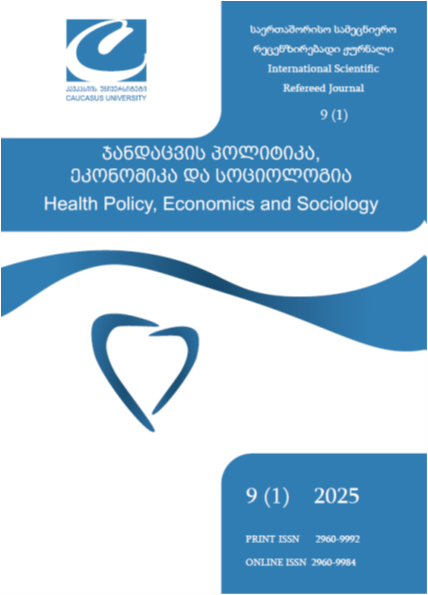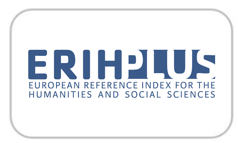გარემოსდაცვითი ემისიები და ჯანდაცვის ხარჯები სუბსაჰარის აფრიკაში: აქვს თუ არა ინსტიტუტების ხარისხს რაიმე როლი?
DOI:
https://doi.org/10.52340/healthecosoc.2025.09.01.09საკვანძო სიტყვები:
ფიქსირებული ეფექტების შეფასების მეთოდი, სუბსაჰარელი აფრიკის რეგიონი, ჯანმრთელობის ხარჯები, ინსტიტუციური ხარისხი, გარემოს ხარისხიანოტაცია
შესავალი: კვლევის მიზანია გარემოსდაცვითი და ინსტიტუციური ხარისხის პირდაპირი და არაპირდაპირი გავლენის შესწავლა ჯანმრთელობის დანახარჯებზე სუბსაჰარელი აფრიკის ქვეყნებში 2002–2021 წლებში. სამუშაო განიხილავს, როგორ მოქმედებს სხვადასხვა დაბინძურების წყარო და კლიმატური ფაქტორი ჯანდაცვის ხარჯვის სხვადასხვა ფორმაზე, და არის თუ არა ინსტიტუციური ხარისხი ამ ურთიერთობების მოდერატორი. მეთოდები: კვლევისთვის გამოყენებულია სუბსაჰარელი აფრიკის ქვეყნების პანელური მონაცემები და გამოყენებულია ფიქსირებული ეფექტების შეფასების ტექნიკა. ანალიზის ობიექტია გარემოსდაცვითი მაჩვენებლები — მეთანის (NH₄), აზოტის ოქსიდის (NO₂), სათბურის გაზების (GHG) და ნახშირორჟანგის (CO₂) ემისიები — ასევე ტემპერატურის დინამიკა და ინსტიტუციური ხარისხის ინდიკატორები, და მათი გავლენა საერთო ჯანმრთელობის მიმდინარე ხარჯებზე (CHE), საჯარო (PUHE), კერძო (PrHE), საგარეო (EHE) და საკუთარი ჯიბიდან გადახდილი (OHE) ხარჯების ფორმებზე. შედეგები: კვლევამ აჩვენა, რომ NH₄, NO₂ და GHG ემისიები მნიშვნელოვნად ზრდის ყველა ტიპის ჯანმრთელობის ხარჯებს, თუმცა განსხვავებული ინტენსივობით. CO₂ ემისიებსაც აქვს დადებითი გავლენა ყველა ხარჯვით მოდელზე, გარდა PUHE-ისა. ტემპერატურის მატება განსაკუთრებით აისახება საჯარო ხარჯებზე. ინსტიტუციური ხარისხი, განსაკუთრებით მთავრობის ეფექტიანობა, მნიშვნელოვნად ასუსტებს ან აძლიერებს CO₂-ის გავლენას ჯანდაცვაზე ყველა მოდელში. ასევე, პოლიტიკური სტაბილურობა, სამართლის უზენაესობა, რეგულირების ხარისხი და ხმა და ანგარიშვალდებულება ასრულებენ მოდერატორის როლს დაბინძურებასა და ჯანმრთელობის დანახარჯებს შორის. ხმასა და ანგარიშვალდებულებას კი ერთადერთი გავლენა აქვს კლიმატის ცვლილებასა და საერთო ხარჯებს შორის კავშირზე. გარდა ამისა, გამოვლინდა გარემოსდაცვითი ფაქტორების არალინარული ეფექტები: NO₂ და GHG PUHE მოდელში, NH₄ და GHG PrHE მოდელში, NH₄ OHE მოდელში და GHG CHE მოდელში. დისკუსია: კვლევის შედეგები ადასტურებენ, რომ გარემოსა და ინსტიტუციურ ფაქტორებს ჯანდაცვის ხარჯებზე კომპლექსური და კონტექსტზე დამოკიდებული გავლენა აქვთ. ძლიერი ინსტიტუციური სტრუქტურები შესაძლოა შეამცირონ ან გააძლიერონ გარემოსდაცვითი სტრესორების ზემოქმედება ჯანდაცვის სისტემებზე. დასკვნა: გარემოს დაბინძურებას სუბსაჰარელი აფრიკის რეგიონში მნიშვნელოვანი გავლენა აქვს ჯანმრთელობის ხარჯებზე, ხოლო ინსტიტუციური ხარისხი ამ პროცესში გადამწყვეტ მოდერატორ როლს ასრულებს. პოლიტიკურმა გადაწყვეტილებებმა კლიმატის მიმართ მდგრადობის სტრატეგიები ინსტიტუციური რეფორმებით უნდა გააერთიანოს, რათა შეამციროს გარემოს ცვლილებებით გამოწვეული ჯანდაცვის ხარჯები.
წყაროები
Alimi O.Y., Ajide, K.B. & Isola, W.A. (2020). Environmental quality and health expenditure in ECOWAS. Environment, Development and Sustainability, Springer, vol. 22(6):5105-5127. https://doi.org/10.1007/s10668-019-00416-2
Andersson, U., Cuervo-Cazurra, A. & Nielsen, B. (2014). From the Editors: Explaining interaction effects within and across levels of analysis. J Int Bus Stud 45, 1063–1071 (2014). https://doi.org/10.1057/jibs.2014.50
Apergis N, Bhattacharya M, Hadhri W. (2020). Health care expenditure and environmental pollution: a cross-country comparison across different income groups. Environ Sci Pollut Res. 2020; 27(8):8142–8156. doi: 10.1007/s11356-019-07457-0.
Barwick, P.J., Li, S., Rao, D. and Zahur, N.B. (2018). The healthcare cost of air pollution: evidence from the world’s largest payment network. Working Paper, National Bureau of Economic Research, Cambridge, MA.
Bayraktar, Y., Aydin, S., Çakır, M.A., Recepoğlu, M., Ozyilmaz, A., Buyukakin, F. & Çakır, S. (2024). Consequences of Information and Communication Technologies and Environmental Degradation on Health Expenditure. INQUIRY, 2024;61. https://doi.org/10.1177/00469580241277449
Chaabouni, S. & Saidi, K. (2017). The dynamic links between carbon dioxide (CO2) emissions, health spending and GDP growth: A case study for 51 countries. Environmental Research, Volume 158, 2017, Pages 137-144, https://doi.org/10.1016/j.envres.2017.05.041.
Chaabouni, S., Zghidi, N. & Mbarek, M.B. (2016). On the causal dynamics between CO2 emissions, health expenditures and economic growth. Sustain. Cities Soc. 22, 184–191. https://doi.org/10.1016/J.SCS.2016.02.001
Chen, F. & Chen, Z. (2021). Cost of economic growth: Air pollution and health expenditure, Science of The Total Environment. Sci Total Environ. Volume 755, Part 1. https://doi.org/10.1016/j.scitotenv.2020.142543
Collischon, M., Eberl, A. (2020). Let’s Talk About Fixed Effects: Let’s Talk About All the Good Things and the Bad Things. Köln Z Soziol 72, 289–299. https://doi.org/10.1007/s11577-020-00699-8
Demir, S., Demir, H., Karaduman, C. & Cetine, M. (2023). Environmental quality and health expenditures efficiency in Türkiye: the role of natural resources. Environ Sci Pollut Res 30, 15170–15185 (2023). https://doi.org/10.1007/s11356-022-23187-2
Dickey, D.A. & Fuller, W.A. (1981). Likelihood Ratio Statistics for Autoregressive Time Series with a Unit Root. Econometrica, Vol. 49, No. 4 (Jul., 1981), pp. 1057-1072. https://doi.org/10.2307/1912517
Driscoll, J., & Kraay, A. C. (1998). Consistent Covariance Matrix Estimation with Spatially Dependent Data. Review of Economics and Statistics, 80, 549-560.
https://doi.org/10.1162/003465398557825
Dritsaki, M., Dritsaki, C., Argyriou, V. & Sarigiannidis, P. (2024). The impact of greenhouse gas emissions and economic growth on health expenditure of EU countries: A panel data analysis. Journal of infrastructure, Policy and Development, Article ID: 4462 Vol 8, Issue 6, 2024
Eckelman, M.J., Huang, K., Lagasse, R., Senay, E., Dubrow, R., Sherman, J.D. (2020). Health care pollution and public health damage in the United States: an update: study examines health care pollution and public health damage in the United States. Health Aff. 2020;39(12):2071–2079. https://doi.org/ 10.1377/hlthaff.2020.01247.
FAO (2024). Temperature change statistics 1961–2023 – Global, regional and country trends. FAOSTAT Analytical Briefs, No. 84. Rome. https://doi.org/10.4060/cd0082en
Fonchamnyo, D.C., Angyie, E-A.P., Afumbom, N.S., Dinga, G.D.& Asongu, S. (2022). Structural change, environmental pollution and health expenditure: Evidence from a global panel, AGDI Working Paper, No. WP/22/071, African Governance and Development Institute (AGDI), Yaoundé
Hausman, J. (1978). Specification Tests in Econometrics. Econometrica, 46, 1251-1271.
https://doi.org/10.2307/1913827
Hussein, M.S. (2023). Institutional quality and economic growth in Sub-Saharan Africa: a panel data approach. Journal of Economics and Development, Vol. 25 No. 4, pp. 332-348. https://doi.org/10.1108/JED-11-2022-0231
Ibukun C.O., Osinubi T.T. (2020). Environmental quality, economic growth, and health expenditure: empirical evidence from a panel of African countries. African Journal of Economic Review, 8 (2), 119-140.
Im K.S., Pesaran, M.H. & Shin, Y. (2003). Testing for Unit Roots in Heterogeneous Panels. Journal of Econometrics, 115, 53-74.
Levin, A., Lin, C.F & Chu, C.S.J. (2002). Unit root tests in panel data: asymptotic and finite-sample properties. Journal of Econometrics, 108, 1-24.
Li, L., Du, T. & Zhang, C. (2020). The Impact of Air Pollution on Healthcare Expenditure for Respiratory Diseases: Evidence from the People's Republic of China. Risk Management and Healthcare Policy Volume 13:1723-1738. https://doi.org/10.2147/RMHP.S270587
Li, X., Smyth, R. & Yao, Y. (2023). Extreme temperatures and out-of-pocket medical expenditure: Evidence from China, China Economic Review, Volume 77. https://doi.org/10.1016/j.chieco.2022.101894.
Liu, Y-M. & Ao, C-K. (2021). Effect of Air Pollution on Health Care Expenditure: Evidence from Respiratory Diseases. Health Economics 2021, 30: 858-875. https://doi.org/10.1002/hec.4221
Musa, N. (2025). The Asymmetric Effects of Climate Change on Health Expenditures in Nigeria: Evidence from Nonlinear ARDL Model. Journal of Applied and Theoretical Social Sciences, 7(1), 67-85. https://doi.org/10.37241/jatss.2025.121
Nyika, F., Anyikwa, I., Mhaka, S., & Mhlanga, D. (2024). Does environmental degradation matter for healthcare expenditure and health outcomes? Evidence from the Caucasus region and Russia (2000–2020). BRICS Journal of Economics, 5(3), 45—67. https://doi.org/10.3897/brics-econ.5.e127270
Orset, C. (2024). Air, land, and water pollutants and public health expenditures: Empirical data from selected EU countries in the transport sector. Journal of Environmental Management, Vol. 356, pp.120534. https://doi.10.1016/j.jenvman.2024.120534
Rahman, M., Dyuti, T.I. & Tareque, M. (2025). Synergy of health cost, globalization and good health: Evidence from emerging economies. Regional Science Policy & Practice, Volume 17, Issue 6. https://doi.org/10.1016/j.rspp.2025.100183
Saboori, B., Mahdavian, S. M., & Radmehr, R. (2024). Assessing the environmental impact of institutional quality at aggregate and disaggregate levels: The role of renewable and non-renewable energy consumption and trade in MENA countries. Sustainable Environment, 10(1). https://doi.org/10.1080/27658511.2024.2426833
Shen, J.S., Wang, Q. & Shen, H.P. (2021). Does industrial air pollution increase health care expenditure? Evidence from China. Frontiers in Public Health, Vol. 9, pp. 1-9, https://doi.org/10.3389/fpubh.2021.69564
Socol, A., Iuga, H., Socol, D., Iuga, J.C. (2023). Does climate change drive up government healthcare costs in the European Union? Sec. Environmental Economics and Management, Volume 11. https://doi.org/10.3389/fenvs.2023.1286099
Ullah, I., Rehman, A., Khan, F.U., Shah, M.H. & Khan, F. (2020). Nexus between trade, CO2 emissions, renewable energy, and health expenditure in Pakistan. Int. J. Health Plann. Manage. 35 (4), 818–831. https://doi.org/10.1002/hpm.2912
United Nations Environment Program (2024). Responding to climate change. https://www.africaleds.org/
Verbeek, M. (2021). 3 Dealing with heterogeneity and endogeneity: fixed effects, IV and GMM. Panel Methods for Finance: A Guide to Panel Data Econometrics for Financial Applications, Berlin, Boston: De Gruyter, 2021, pp. 68-106. https://doi.org/10.1515/9783110660739-003
Wang, N., Ullah, A., Lin, X., Zhang, T. & Mao, J. (2022). Dynamic influence of urbanization on inclusive green growth in belt and road countries: The moderating role of governance. Sustainability 14 (18), 11623. https://doi.org/10.3390/su141811623
Wei, J., Rahim, S. & Wang, S. (2022). Role of Environmental Degradation, Institutional Quality, and Government Health Expenditures for Human Health: Evidence from Emerging Seven Countries. Sec. Environmental Health and Exposome. Volume 10 - 2022 https://doi.org/10.3389/fpubh.2022.870767
Yakubu, I.N., Musah, A. & Danaa, I.A. (2024). Environmental sustainability and government health expenditure in Africa: is there a nexus? Technological Sustainability, Vol. 3 No. 4, pp. 416-427. https://doi.org/10.1108/TECHS-01-2024-0002
Yazdi, S.K. & Khanalizadeh, B. (2017) Air pollution, economic growth and health care expenditure, Economic Research-Ekonomska Istraživanja, 30:1, 1181-1190, https://doi.org/10.1080/1331677X.2017.1314823
Yadav, M., Aneja, R. & Ahmed, W. (2023). Do clean energy transition, environment degradation, and energy efficiency influence health expenditure: Empirical evidence from emerging countries, Journal of Cleaner Production, Volume 428, 2023, https://doi.org/10.1016/j.jclepro.2023.139355














